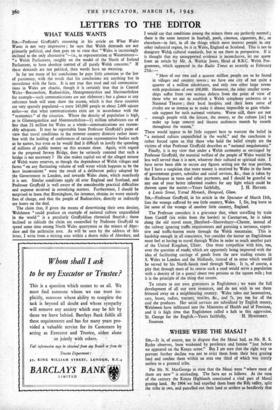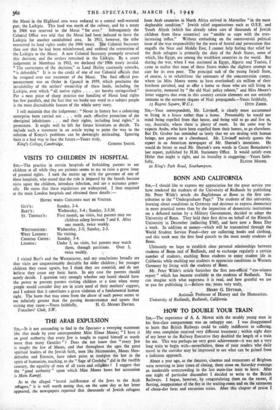WHERE WERE THE MASAI ?
SIR,—It is, of course, not in dispute that the Masai had, as Mr. R. S. Ryder observes, been weakened by pestilence and famine " just before we appeared on the Kenya scene." But I am sure that the right way to prevent further decline was not to evict them from their best grazing land and confine them within an area one third of which was utterly useless to a pastoral tribe.
For Mr. N. MacGeorge to state that the Masai were " where most of them are now " is misleading. The facts are as follows. At the turn of the century the Kenya Highlands constituted a vital part of Masai grazing land. By 1904 we had expelled them from the Rift valley, split the tribe in two, and parcelled out their land to settlers so heedlessly that
the Masai in the Highland area were reduced to a central well-watered part, the Laikipia. This land was north of the railway, and by a treaty
in 1906 was reserved to the Masai "for ever." Subsequently the Colonial Office was told that the Masai had been induced to leave the Laikipia for another uninhabited area. In 1911, however, the tribe reasserted its land rights under the 1906 treaty. The Colonial Secretary then saw that he had been misinformed, and ordered the restoration of the Laikipia to the Masai. A new Colonial Secretary promptly reversed this decision, and the settlers remained in the L'aikipia. By a court judgement in Mombasa in 1912, we declared the 1906 treaty invalid. " The correctness of the decision," as Lord Hailey cautiously remarks, "is debatable." It is to the credit of one of our Colonial officials that he resigned over our treatment of the Masai. The final official pro- nouncement was an Order in Council in 1939, which proclaims the inviolability of the settlers' ownership of these lands, including the Laikipia, over which." all native rights . . . . are hereby extinguished." For a neat piece of sharp practice our handling of Masai land rights has few parallels, and the fact that we broke our word to .a subject people is the most discreditable feature of the whole sorry story.
I still maintain that the judgement: "Never in history has a colonising enterprise been carried out . . . with such effective protection of the aboriginal inhabitants . . . and their rights, including land rights," is premature. It might well be left for future historians to decide. To include such a statement in an article trying to point the way to the solution of Kenya's problems can be downright misleading. Ignoring facts is a bad way to face the future.--Yours truly,







































 Previous page
Previous page